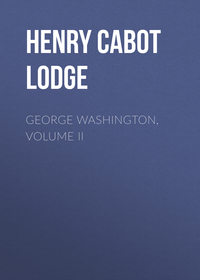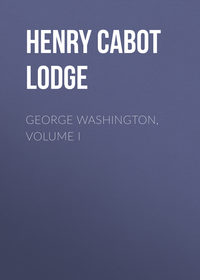 полная версия
полная версияDaniel Webster
Before the new President was inaugurated, in the winter of 1848-49, the struggle began in Congress, which led to the delivery of the 7th of March speech by Mr. Webster in the following year. At this point, therefore, it becomes necessary to turn back and review briefly and rapidly Mr. Webster's course in regard to the question of slavery.
His first important utterance on this momentous question was in 1819, when the land was distracted with the conflict which had suddenly arisen over the admission of Missouri. Massachusetts was strongly in favor of the exclusion of slavery from the new States, and utterly averse to any compromise. A meeting was held in the state-house at Boston, and a committee was appointed to draft a memorial to Congress, on the subject of the prohibition of slavery in the territories. This memorial,—which was afterwards adopted,—was drawn by Mr. Webster, as chairman of the committee. It set forth, first, the belief of its signers that Congress had the constitutional power "to make such a prohibition a condition on the admission of a new State into the Union, and that it is just and proper that they should exercise that power." Then came an argument on the constitutional question, and then the reasons for the exercise of the power as a general policy. The first point was that it would prevent further inequality of representation, such as existed under the Constitution in the old States, but which could not be increased without danger. The next argument went straight to the merits of the question, as involved in slavery as a system. After pointing out the value of the ordinance of 1787 to the Northwest, the memorial continued:—
"We appeal to the justice and the wisdom of the national councils to prevent the further progress of a great and serious evil. We appeal to those who look forward to the remote consequences of their measures, and who cannot balance a temporary or trifling convenience, if there were such, against a permanent growing and desolating evil.
"… The Missouri territory is a new country. If its extensive and fertile fields shall be opened as a market for slaves, the government will seem to become a party to a traffic, which in so many acts, through so many years, it has denounced as impolitic, unchristian, and inhuman…. The laws of the United States have denounced heavy penalties against the traffic in slaves, because such traffic is deemed unjust and inhuman. We appeal to the spirit of these laws; we appeal to this justice and humanity; we ask whether they ought not to operate, on the present occasion, with all their force? We have a strong feeling of the injustice of any toleration of slavery. Circumstances have entailed it on a portion of our community, which cannot be immediately relieved from it without consequences more injurious than the suffering of the evil. But to permit it in a new country, where yet no habits are formed which render it indispensable, what is it but to encourage that rapacity and fraud and violence against which we have so long pointed the denunciation of our penal code? What is it but to tarnish the proud fame of the country? What is it but to render questionable all its professions of regard for the rights of humanity and the liberties of mankind."
A year later Mr. Webster again spoke on one portion of this subject, and in the same tone of deep hostility and reproach. This second instance was that famous and much quoted passage of his Plymouth oration in which he denounced the African slave-trade. Every one remembers the ringing words:—
"I hear the sound of the hammer, I see the smoke of the furnaces where manacles and fetters are still forged for human limbs. I see the visages of those who, by stealth and at midnight, labor in this work of hell,—foul and dark as may become the artificers of such instruments of misery and torture. Let that spot be purified, or let it cease to be of New England. Let it be purified, or let it be set aside from the Christian world; let it be put out of the circle of human sympathies and human regards, and let civilized man henceforth have no communion with it."
This is directed against the African slave-trade, the most hideous feature, perhaps, in the system. But there was no real distinction between slavers plying from one American port to another and those which crossed the ocean for the same purpose. There was no essential difference between slaves raised for the market in Virginia—whence they were exported and sold—and those kidnapped for the same object on the Guinea coast. The physical suffering of a land journey might be less than that of a long sea-voyage, but the anguish of separation between mother and child was the same in all cases. The chains which clanked on the limbs of the wretched creatures, driven from the auction block along the road which passed beneath the national capitol, and the fetters of the captured fugitive were no softer or lighter than those forged for the cargo of the slave-ships. Yet the man who so magnificently denounced the one in 1820, found no cause to repeat the denunciation in 1850, when only domestic traffic was in question. The memorial of 1819 and the oration of 1820 place the African slave-trade and the domestic branch of the business on precisely the same ground of infamy and cruelty. In 1850 Mr. Webster seems to have discovered that there was a wide gulf fixed between them, for the latter wholly failed to excite the stern condemnation poured forth by the memorialist of 1819 and the orator of 1820. The Fugitive Slave Law, more inhuman than either of the forms of traffic, was defended in 1850 on good constitutional grounds; but the eloquent invective of the early days against an evil which constitutions might necessitate but could not alter or justify, does not go hand in hand with the legal argument.
The next occasion after the Missouri Compromise, on which slavery made its influence strongly felt at Washington, was when Mr. Adams's scheme of the Panama mission aroused such bitter and unexpected resistance in Congress. Mr. Webster defended the policy of the President with great ability, but he confined himself to the international and constitutional questions which it involved, and did not discuss the underlying motive and true source of the opposition. The debate on Foote's resolution in 1830, in the wide range which it took, of course included slavery, and Mr. Hayne had a good deal to say on that subject, which lay at the bottom of the tariff agitation, as it did at that of every Southern movement of any real importance. In his reply, Mr. Webster said that he had made no attack upon this sensitive institution, that he had simply stated that the Northwest had been greatly benefited by the exclusion of slavery, and that it would have been better for Kentucky if she had come within the scope of the ordinance of 1787. The weight of his remarks was directed to showing that the complaint of Northern attacks on slavery as existing in the Southern States, or of Northern schemes to compel the abolition of slavery, was utterly groundless and fallacious. At the same time he pointed out the way in which slavery was continually used to unite the South against the North.
"This feeling," he said, "always carefully kept alive, and maintained at too intense a heat to admit discrimination or reflection, is a lever of great power in our political machine. There is not and never has been a disposition in the North to interfere with these interests of the South. Such interference has never been supposed to be within the power of government; nor has it been in any way attempted. The slavery of the South has always been regarded as a matter of domestic policy left with the States themselves, and with which the Federal government had nothing to do. Certainly, sir, I am and ever have been of that opinion. The gentleman, indeed, argues that slavery, in the abstract, is no evil. Most assuredly, I need not say I differ with him altogether and most widely on that point. I regard domestic slavery as one of the greatest evils, both moral and political."
His position is here clearly defined. He admits fully that slavery within the States cannot be interfered with by the general government, under the Constitution. But he also insists that it is a great evil, and the obvious conclusion is, that its extension, over which the government does have control, must and should be checked. This is the attitude of the memorial and the oration. Nothing has yet changed. There is less fervor in the denunciation of slavery, but that may be fairly attributed to circumstances which made the maintenance of the general government and the enforcement of the revenue laws the main points in issue.
In 1836 the anti-slavery movement, destined to grow to such vast proportions, began to show itself in the Senate. The first contest came on the reception of petitions for the abolition of slavery in the District of Columbia. Mr. Calhoun moved that these petitions should not be received, but his motion was rejected by a large majority. The question then came on the petitions themselves, and, by a vote of thirty-four to six, their prayer was rejected, Mr. Webster voting with the minority because he disapproved this method of disposing of the matter. Soon after, Mr. Webster presented three similar petitions, two from Massachusetts and one from Michigan, and moved their reference to a committee of inquiry. He stated that, while the government had no power whatever over slavery in the States, it had complete control over slavery in the District, which was a totally distinct affair. He urged a respectful treatment of the petitions, and defended the right of petition and the motives and characters of the petitioners. He spoke briefly, and, except when he was charged with placing himself at the head of the petitioners, coldly, and did not touch on the merits of the question, either as to the abolition of slavery in the District or as to slavery itself.
The Southerners, especially the extremists and the nullifiers, were always more ready than any one else to strain the powers of the central government to the last point, and use them most tyrannically and illegally in their own interest and in that of their pet institution. The session of 1836 furnished a striking example of this characteristic quality. Mr. Calhoun at that time introduced his monstrous bill to control the United States mails in the interests of slavery, by authorizing postmasters to seize and suppress all anti-slavery documents. Against this measure Mr. Webster spoke and voted, resting his opposition on general grounds, and sustaining it by a strong and effective argument. In the following year, on his way to the North, after the inauguration of Mr. Van Buren, a great public reception was given to him in New York, and on that occasion he made the speech in Niblo's Garden, where he defined the Whig principles, arraigned so powerfully the policy of Jackson, and laid the foundation for the triumphs of the Harrison campaign. In the course of that speech he referred to Texas, and strongly expressed his belief that it should remain independent and should not be annexed. This led him to touch upon slavery. He said:—
"I frankly avow my entire unwillingness to do anything that shall extend the slavery of the African race on this continent, or add other slave-holding States to the Union. When I say that I regard slavery in itself as a great moral, social, and political evil, I only use the language which has been adopted by distinguished men, themselves citizens of slave-holding States. I shall do nothing, therefore, to favor or encourage its further extension. We have slavery already amongst us. The Constitution found it in the Union, it recognized it, and gave it solemn guaranties. To the full extent of the guaranties we are all bound in honor, in justice, and by the Constitution…. But when we come to speak of admitting new States, the subject assumes an entirely different aspect…. In my opinion, the people of the United States will not consent to bring into the Union a new, vastly extensive, and slave-holding country, large enough for half a dozen or a dozen States. In my opinion, they ought not to consent to it…. On the general question of slavery a great portion of the community is already strongly excited. The subject has not only attracted attention as a question of politics, but it has struck a far deeper-toned chord. It has arrested the religious feeling of the country; it has taken strong hold on the consciences of men. He is a rash man, indeed, and little conversant with human nature, and especially has he a very erroneous estimate of the character of the people of this country, who supposes that a feeling of this kind is to be trifled with or despised. It will assuredly cause itself to be respected. It may be reasoned with, it may be made willing—I believe it is entirely willing—to fulfil all existing engagements and all existing duties, to uphold and defend the Constitution as it is established, with whatever regrets about some provisions which it does actually contain. But to coerce it into silence, to endeavor to restrain its free expression, to seek to compress and confine it, warm as it is and more heated as such endeavors would inevitably render it,—should this be attempted, I know nothing, even in the Constitution or in the Union itself, which would not be endangered by the explosion which might follow."
Thus Mr. Webster spoke on slavery and upon the agitation against it, in 1837. The tone was the same as in 1820, and there was the same ring of dignified courage and unyielding opposition to the extension and perpetuation of a crying evil.
In the session of Congress preceding the speech at Niblo's Garden, numerous petitions for the abolition of slavery in the District had been offered. Mr. Webster reiterated his views as to the proper disposition to be made of them; but announced that he had no intention of expressing an opinion as to the merits of the question. Objections were made to the reception of the petitions, the question was stated on the reception, and the whole matter was laid on the table. The Senate, under the lead of Calhoun, was trying to shut the door against the petitioners, and stifle the right of petition; and there was no John Quincy Adams among them to do desperate battle against this infamous scheme.
In the following year came more petitions, and Mr. Calhoun now attempted to stop the agitation in another fashion. He introduced a resolution to the effect that these petitions were a direct and dangerous attack on the "institution" of the slave-holding States. This Mr. Clay improved in a substitute, which stated that any act or measure of Congress looking to the abolition of slavery in the District would be a violation of the faith implied in the cession by Virginia and Maryland,—a just cause of alarm to the South, and having a direct tendency to disturb and endanger the Union. Mr. Webster wrote to a friend that this was an attempt to make a new Constitution, and that the proceedings of the Senate, when they passed the resolutions, drew a line which could never be obliterated. Mr. Webster also spoke briefly against the resolutions, confining himself strictly to demonstrating the absurdity of Mr. Clay's doctrine of "plighted faith." He disclaimed carefully, and even anxiously, any intention of expressing an opinion on the merits of the question; although he mentioned one or two reasonable arguments against abolition. The resolutions were adopted by a large majority, Mr. Webster voting against them on the grounds set forth in his speech. Whether the approaching presidential election had any connection with his careful avoidance of everything except the constitutional point, which contrasted so strongly with his recent utterances at Niblo's Garden, it is, of course, impossible to determine. John Quincy Adams, who had no love for Mr. Webster, and who was then in the midst of his desperate struggle for the right of petition, says, in his diary, in March, 1838, speaking of the delegation from Massachusetts:—
"Their policy is dalliance with the South; and they care no more for the right of petition than is absolutely necessary to satisfy the feeling of their constituents. They are jealous of Cushing, who, they think, is playing a double game. They are envious of my position as the supporter of the right of petition; and they truckle to the South to court their favor for Webster. He is now himself tampering with the South on the slavery and the Texas question."
This harsh judgment may or may not be correct, but it shows very plainly that Mr. Webster's caution in dealing with these topics was noticed and criticised at this period. The annexation of Texas, moreover, which he had so warmly opposed, seemed to him, at this juncture, and not without reason, to be less threatening, owing to the course of events in the young republic. Mr. Adams did not, however, stand alone in thinking that Mr. Webster, at this time, was lukewarm on the subject. In 1839 Mr. Giddings says "that it was impossible for any man, who submitted so quietly to the dictation of slavery as Mr. Webster, to command that influence which was necessary to constitute a successful politician." How much Mr. Webster's attitude had weakened, just at this period, is shown better by his own action than by anything Mr. Giddings could say. The ship Enterprise, engaged in the domestic slave-trade from Virginia to New Orleans, had been driven into Port Hamilton, and the slaves had escaped. Great Britain refused compensation. Thereupon, early in 1840, Mr. Calhoun introduced resolutions declaratory of international law on this point, and setting forth that England had no right to interfere with, or to permit, the escape of slaves from vessels driven into her ports. The resolutions were idle, because they could effect nothing, and mischievous because they represented that the sentiment of the Senate was in favor of protecting the slave-trade. Upon these resolutions, absurd in character and barbarous in principle, Mr. Webster did not even vote. There is a strange contrast here between the splendid denunciation of the Plymouth oration and this utter lack of opinion, upon resolutions designed to create a sentiment favorable to the protection of slave-ships engaged in the domestic traffic. Soon afterwards, when Mr. Webster was Secretary of State, he advanced much the same doctrine in the discussion of the Creole case, and his letter was approved by Calhoun. There may be merit in the legal argument, but the character of the cargo, which it was sought to protect, put it beyond the reach of law. We have no need to go farther than the Plymouth oration to find the true character of the trade in human beings as carried on upon the high seas.
After leaving the cabinet, and resuming his law practice, Mr. Webster, of course, continued to watch with attention the progress of events. The formation of the Liberty party, in the summer of 1843, appeared to him a very grave circumstance. He had always understood the force of the anti-slavery movement at the North, and it was with much anxiety that he now saw it take definite shape, and assume extreme grounds of opposition. This feeling of anxiety was heightened when he discovered, in the following winter, while in attendance upon the Supreme Court at Washington, the intention of the administration to bring about the annexation of Texas, and spring the scheme suddenly upon the country. This policy, with its consequence of an enormous extension of slave territory, Mr. Webster had always vigorously and consistently opposed, and he was now thoroughly alarmed. He saw what an effect the annexation would produce upon the anti-slavery movement, and he dreaded the results. He therefore procured the introduction of a resolution in Congress against annexation; wrote some articles in the newspapers against it himself; stirred up his friends in Washington and New York to do the same, and endeavored to start public meetings in Massachusetts. His friends in Boston and elsewhere, and the Whigs generally, were disposed to think his alarm ill-founded. They were absorbed in the coming presidential election, and were too ready to do Mr. Webster the injustice of supposing that his views upon the probability of annexation sprang from jealousy of Mr. Clay. The suspicion was unfounded and unfair. Mr. Webster was wholly right and perfectly sincere. He did a good deal in an attempt to rouse the North. The only criticism to be made is that he did not do more. One public meeting would have been enough, if he had spoken frankly, declared that he knew, no matter how, that annexation was contemplated, and had then denounced it as he did at Niblo's Garden. "One blast upon his bugle-horn were worth a thousand men." Such a speech would have been listened to throughout the length and breadth of the land; but perhaps it was too much to expect this of him in view of his delicate relations with Mr. Clay. At a later period, in the course of the campaign, he denounced annexation and the increase of slave territory, but unfortunately it was then too late. The Whigs had preserved silence on the subject at their convention, and it was difficult to deal with it without reflecting on their candidate. Mr. Webster vindicated his own position and his own wisdom, but the mischief could not then be averted. The annexation of Texas after the rejection of the treaty in 1844 was carried through, nearly a year later, by a mixture of trickery and audacity in the last hours of the Tyler administration.
Four days after the consummation of this project Mr. Webster took his seat in the Senate, and on March 11 wrote to his son that, "while we feel as we ought about the annexation of Texas, we ought to keep in view the true grounds of objection to that measure. Those grounds are,—want of constitutional power,—danger of too great an extent of territory, and opposition to the increase of slavery and slave representation. It was properly considered, also, as a measure tending to produce war." He then goes on to argue that Mexico had no good cause for war; but it is evident that he already dreaded just that result. When Congress assembled again, in the following December, the first matter to engage their attention was the admission of Texas as a State of the Union. It was impossible to prevent the passage of the resolution, but Mr. Webster stated his objections to the measure. His speech was brief and very mild in tone, if compared with the language which he had frequently used in regard to the annexation. He expressed his opposition to this method of obtaining new territory by resolution instead of treaty, and to acquisition of territory as foreign to the true spirit of the Republic, and as endangering the Constitution and the Union by increasing the already existing inequality of representation, and extending the area of slavery. He dwelt on the inviolability of slavery in the States, and did not touch upon the evils of the system itself.
By the following spring the policy of Mr. Polk had culminated, intrigue had done its perfect work, hostilities had been brought on with Mexico, and in May Congress was invited to declare a war which the administration had taken care should already exist. Mr. Webster was absent at this time, and did not vote on the declaration of war; and when he returned he confined himself to discussing the war measures, and to urging the cessation of hostilities, and the renewal of efforts to obtain peace.
The next session—that of the winter of 1846-47—was occupied, of course, almost entirely with the affairs of the war. In these measures Mr. Webster took scarcely any part; but toward the close of the session, when the terms on which the war should be concluded were brought up, he again came forward. February 1, 1847, Mr. Wilmot of Pennsylvania introduced the famous proviso, which bears his name, as an amendment to the bill appropriating three millions of dollars for extraordinary expenses. By this proviso slavery was to be excluded from all territory thereafter acquired or annexed by the United States. A fortnight later Mr. Webster, who was opposed to the acquisition of more territory on any terms, introduced two resolutions in the Senate, declaring that the war ought not to be prosecuted for the acquisition of territory, and that Mexico should be informed that we did not aim at seizing her domain. A similar resolution was offered by Mr. Berrien of Georgia, and defeated by a party vote. On this occasion Mr. Webster spoke with great force and in a tone of solemn warning against the whole policy of territorial aggrandizement. He denounced all that had been done in this direction, and attacked with telling force the Northern democracy, which, while it opposed slavery and favored the Wilmot Proviso, was yet ready to admit new territory, even without the proviso. His attitude at this time, in opposition to any further acquisition of territory on any terms, was strong and determined, but his policy was a terrible confession of weakness. It amounted to saying that we must not acquire territory because we had not sufficient courage to keep slavery out of it. The Whigs were in a minority, however, and Mr. Webster could effect nothing. When the Wilmot Proviso came before the Senate Mr. Webster voted for it, but it was defeated, and the way was clear for Mr. Polk and the South to bring in as much territory as they could get, free of all conditions which could interfere with the extension of slavery. In September, 1847, after speaking and voting as has just been described in the previous session of Congress, Mr. Webster addressed the Whig convention at Springfield on the subject of the Wilmot Proviso. What he then said is of great importance in any comparison which may be made between his earlier views and those which he afterwards put forward, in March, 1850, on the same subject. The passage is as follows:—





